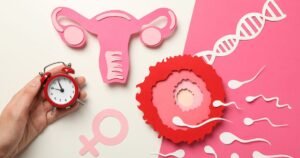Last Updated on 14 June 2024
UPDATED 09 FEBRUARY 2024
Congratulations! You might be pregnant! The first week of pregnancy is exciting for women trying to conceive. It is the perfect time to start caring for yourself while nurturing a healthy pregnancy. But how do you know if you are pregnant? What are the early signs of pregnancy in the first week? In this article, we will discuss all of that and more. We will explain everything about early pregnancy, common symptoms, and even precautions you can take to ensure a healthy pregnancy. So sit back, relax, and let us dive into this fantastic journey!
Understanding Early Pregnancy
Early pregnancy refers to the period from conception to the end of the first trimester. This is a period of significant hormonal changes and rapid fetal development. The fertilized egg travels through the fallopian tube and implants in the uterine lining. This implantation triggers a series of hormonal changes in the body. Increased progesterone and estrogen levels trigger various physical and emotional changes in preparation for pregnancy. Understanding early pregnancy and being aware of the changes during this time is essential for the mother’s and baby’s health.
Early Signs of Pregnancy
Women are likely to experience the first signs of pregnancy one week after implantation. These signs and symptoms can vary from woman to woman, but a few common indicators may suggest pregnancy. Some of the early signs of pregnancy include a missed period, frequent urination, fatigue, breast changes, and morning sickness.
It is important to note that while these symptoms may indicate pregnancy, they can also be attributed to other factors. If you suspect you may be pregnant, the only way to know for sure is to take a pregnancy test for confirmation.
Missed Period
One of the most telltale early signs of pregnancy is a missed period. If you are usually regular with your menstrual cycle, a missed period may indicate a fertilized egg has implanted in your uterine lining. Remember that a missed period alone is not a definitive sign of pregnancy, as there can be other underlying causes for a missed period. It is recommended to take a pregnancy test for confirmation if you have missed your period and suspect that you may be pregnant. It is always best to consult your healthcare provider for a proper diagnosis.
Frequent Urination
Frequent urination is one of the early signs of pregnancy that may occur in the first week. The frequent urination is due to hormonal changes, specifically the increased hormone hCG (human chorionic gonadotropin). The placenta produces this hormone, which increases blood flow to the pelvic region, hence the need to urinate more frequently. It is always advisable to consult your healthcare provider for a proper diagnosis and rule out any other potential causes.
Fatigue
Feeling fatigued is one of the symptoms in the first week of pregnancy and one of the most common early signs of pregnancy. Fatigue is often attributed to hormonal changes, increased blood pressure, and the body’s effort to accommodate a growing baby.
The early stages of pregnancy can be physically and emotionally demanding, leading to a feeling of constant tiredness. Listening to your body and getting enough rest during this time is essential. Incorporating light exercise and practicing stress management techniques, such as meditation or yoga, can also help combat fatigue. If you are experiencing excessive fatigue that interferes with your daily activities, it is advisable to consult with your healthcare provider for further evaluation and guidance.
Breast Changes
Changes in the breasts are common early signs of pregnancy that may occur in the first week. These changes are a result of hormonal fluctuations and the preparation of the breast tissue for milk production. Some of the breast changes that you may experience in the first week of pregnancy include breast tenderness or soreness, increased sensitivity of the nipples, enlargement of the breasts, and darkening of the areolas.
These changes are normal and a sign that your body is preparing for the possibility of breastfeeding. It is essential to wear a supportive bra and avoid activities that may cause discomfort or pain in the breasts. If you are concerned about any changes in your breasts, it is advisable to consult with your healthcare provider for a proper evaluation and guidance.
Nausea and vomiting
Nausea and vomiting, commonly known as morning sickness, are early signs of pregnancy. While the exact cause of morning sickness is not fully understood, hormonal changes in the body and a heightened sense of smell are believed to contribute to this symptom.
According to the American College of Obstetricians and Gynecologists (ACOG), morning sickness usually doesn’t harm the fetus but can significantly impact a woman’s daily life. There are safe treatment options that can help alleviate symptoms and improve quality of life. If morning sickness becomes severe and affects your ability to function, it is advisable to consult your healthcare provider for further evaluation and possible treatment options.
Implantation bleeding or spotting
Implantation bleeding or spotting can be one of the early signs of pregnancy in one week. This light bleeding occurs when the fertilized egg attaches itself to the uterus lining, usually around 6 to 12 days after conception. The bleeding may appear as light spotting and can last a few hours to a few days. It is important to note that implantation bleeding is typically lighter and shorter in duration than a standard period.
If you are experiencing light bleeding or spotting and suspect that you may be pregnant, it is recommended that you take a pregnancy test for confirmation. It is also advisable to consult with your healthcare provider for a proper evaluation and to rule out any other potential causes of the bleeding.
Cramping

Mild cramping in the lower abdomen can be an early sign of pregnancy, occurring in the first week after conception. These cramps may feel similar to menstrual cramps and may be attributed to the implantation of the fertilized egg in the uterus. Hormonal changes in the body can lead to cramping in the early stages of pregnancy. Some women may experience implantation cramps resulting from the egg attaching to the uterine lining.
It is important to note that cramping, along with light spotting, may occur around the time of your expected period, leading to confusion between pregnancy and a regular period. If you are experiencing severe or persistent cramping, it is advisable to consult with your healthcare provider for further evaluation and guidance.
Constipation
Constipation is one of the most common symptoms in the first week of pregnancy. Hormonal changes and increased progesterone levels can slow down the digestive system, leading to constipation. To alleviate constipation, increasing your fiber intake, staying hydrated, and engaging in regular physical activity are recommended. If you are experiencing severe or persistent constipation, it is advisable to consult with your healthcare provider for further evaluation and guidance.
Mood swings
Mood swings are common early signs of pregnancy that may occur in the first week. Hormonal changes, such as increased progesterone, can impact neurotransmitters in the brain and affect emotions. Managing stress, getting enough rest, and maintaining a healthy lifestyle can help alleviate mood swings during pregnancy. Communicating openly with your partner and seeking support from your healthcare provider, friends, and family is essential. Understanding that mood swings are a normal part of pregnancy and finding healthy coping mechanisms can help in navigating the emotional changes that may occur in the first week and throughout pregnancy.
Abdominal bloating
Hormonal changes and slowed digestion often cause abdominal bloating in early pregnancy. Bloating may be due to increased progesterone levels, which can lead to relaxation of the intestinal muscles. Avoiding foods that contribute to gas and bloating, such as carbonated drinks and fatty foods, can help minimize abdominal discomfort. Wearing loose, comfortable clothing and staying physically active can also help alleviate abdominal bloating. If you are experiencing severe or persistent bloating, it is advisable to consult with your healthcare provider for further evaluation and guidance.
When should I take a pregnancy test?
If you suspect you may be pregnant, taking a pregnancy test is the next step in confirming your pregnancy. Pregnancy tests are an effective and reliable way to determine if you are pregnant. These tests detect the presence of the hormone HCG (human chorionic gonadotropin) in your urine or blood. For accurate results, it is best to take a pregnancy test after a missed period or at least one week after a possible conception date. Some home pregnancy tests claim to detect pregnancy hormone levels early, but waiting until after a missed period or around the first day of your last period is recommended for more reliable results.
If your pregnancy test comes back positive and you have a clear recollection of the first day of your last period, consider using a due date calculator. This helpful tool can provide you with an estimated due date, offering valuable insight into your pregnancy timeline.
Could you have early pregnancy symptoms and not be pregnant?
It is possible to experience symptoms of pregnancy and not be pregnant. Other causes of pregnancy symptoms include hormonal changes, illness, and stress. These factors can sometimes mimic early pregnancy symptoms, leading to confusion. If you are experiencing early pregnancy symptoms but have received a negative pregnancy test result, it is advisable to consult with your healthcare provider for further evaluation. They can help determine the possible causes of your symptoms and provide guidance and support during this time.
What precautions should you take during an early pregnancy?
Taking the necessary precautions during early pregnancy is essential for the health and well-being of both the mother and the baby. Early pregnancy is a critical time for the baby’s development, and certain precautions can help ensure a healthy pregnancy. It is recommended to consult with your healthcare provider for personalized advice, but there are some general precautions you can take during early pregnancy.
- Consult your healthcare provider before taking any medications or supplements, as some may not be safe during pregnancy.
- Refrain from smoking, drinking alcohol, and using drugs, as these can have harmful effects on the baby’s development.
- Be cautious of foodborne illnesses, and consume only pasteurized dairy and well-cooked foods to minimize the risk of food poisoning.
- Avoid exposure to radiation and strong chemicals, as they can pose a risk to the baby’s development and overall health.
- Consult your healthcare provider about travel restrictions during pregnancy, as specific destinations and activities may not be safe for pregnant women.
Following these precautions and seeking regular prenatal care are crucial for a healthy and successful pregnancy. Your healthcare provider can provide personalized guidance and recommendations based on your needs and medical history.
Lifestyle Adjustments in Early Pregnancy
Making necessary lifestyle adjustments during early pregnancy is important to support the health and well-being of both the mother and the baby. Here are some lifestyle adjustments you should consider:
- Embrace a balanced and nutritious diet that includes a variety of fruits, vegetables, whole grains, lean proteins, and dairy products.
- Engage in light exercise, such as walking or prenatal yoga, to support a healthy pregnancy and maintain overall well-being.
- Prioritize quality sleep and practice good sleep hygiene by establishing a bedtime routine and creating a comfortable sleeping environment.
- Manage stress through relaxation techniques, such as deep breathing, meditation, or prenatal massages, and seek support from your healthcare provider, friends, and family members.
- Stay informed about prenatal care and connect with a supportive community of expectant mothers for guidance and emotional support.
- Plan regular prenatal appointments and follow your healthcare provider’s recommendations for prenatal vitamins, screenings, and tests.
As you are excitedly expecting your little one, we invite you to keep exploring our pregnancy week-by-week articles. They provide an amazing peek into how your baby grows from the very beginning. From the time you conceive to the day your baby arrives, these resources offer helpful insights and information to guide you.
Stay curious, stay informed, and treasure each moment as you get ready to welcome your new bundle of joy into your family.









